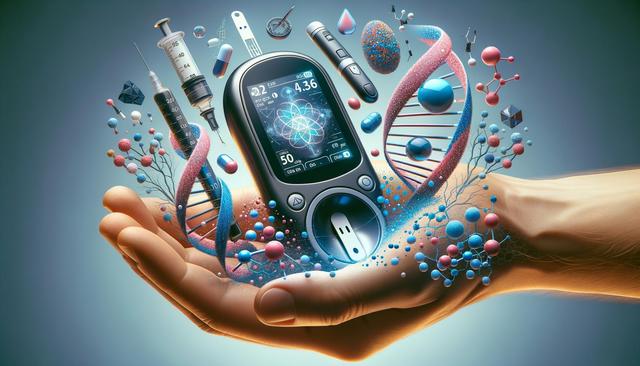How Continuous Glucose Monitoring Enhances Diabetes Management
Continuous glucose monitoring empowers diabetes care by providing real-time blood sugar insights. These devices reduce guesswork and promote timely interventions, leading to better long-term management and improved quality of life for those living with the condition.

What Is Continuous Glucose Monitoring?
Continuous glucose monitoring (CGM) is a technology designed to track glucose levels in real time throughout the day and night. Unlike traditional finger-prick methods that offer only a snapshot of blood sugar at a single point, CGM provides a comprehensive view of glucose trends and fluctuations. These systems typically consist of a small sensor inserted under the skin, a transmitter that sends data, and a receiver or smartphone app that displays the readings.
CGMs work by measuring the glucose present in the interstitial fluid—the fluid surrounding the body’s cells. This data is updated every few minutes, allowing users to monitor their blood sugar without repeated manual testing. This continuous stream of information helps individuals with diabetes make informed decisions about their meals, activity levels, and medication adjustments.
Some of the core benefits of CGM include:
- Fewer fingersticks required
- Alerts for high and low blood sugar levels
- Detailed glucose trend reports
- Improved ability to identify patterns and triggers
By offering this level of insight, CGM plays a critical role in modern diabetes care, aiding both patients and healthcare providers in personalizing treatment strategies.
Improving Glycemic Control
One of the most significant advantages of CGM is its ability to support better glycemic control. With frequent updates on glucose levels, users can act swiftly to prevent highs (hyperglycemia) or lows (hypoglycemia), reducing the risk of complications. Real-time data helps users understand how different foods, physical activity, stress, and medications impact their blood sugar levels.
CGM also supports goal-setting by helping users maintain their glucose within a target range more consistently. This metric, known as Time in Range (TIR), has become a key indicator of diabetes management success. Studies have shown that increased TIR is associated with a lower risk of long-term complications like neuropathy, retinopathy, and kidney disease.
Additionally, CGM data can be shared with healthcare providers in real time or during check-ups, enabling more precise treatment decisions. This collaborative approach fosters a proactive model of care that focuses on prevention and early intervention.
Reducing the Mental Burden of Diabetes
Managing diabetes can be mentally and emotionally taxing. The constant need to monitor blood sugar, plan meals, and adjust insulin doses can lead to burnout. CGM can ease some of this burden by automating the tracking process and reducing the uncertainty that often comes with traditional methods.
With CGM, users no longer need to guess whether their blood sugar is rising or falling. Instead, they receive timely alerts that allow them to respond before a problem escalates. This level of awareness can provide peace of mind and improve overall confidence in managing the condition.
Specific ways CGM helps reduce mental strain include:
- Real-time alerts reduce anxiety about unexpected lows
- Data trends help users feel more in control
- Less need for frequent fingersticks reduces discomfort
- Improved sleep quality due to nighttime alerts
By supporting emotional well-being alongside physical health, CGM contributes to a more balanced and sustainable approach to living with diabetes.
Empowering Lifestyle Adjustments
Another critical role of CGM in diabetes care is its ability to support informed lifestyle changes. Because users can see how their blood sugar responds to specific behaviors, they are better equipped to make positive adjustments in real time. For instance, seeing a spike after a certain meal may encourage a person to modify their portion size or food choice next time.
CGM also helps in planning physical activity. Exercise affects blood sugar differently depending on the duration, intensity, and timing. With CGM, users can monitor these effects and adjust their routines to avoid glucose drops or spikes. This real-time feedback makes it easier to integrate healthy habits without fear of unpredictable blood sugar changes.
Key lifestyle areas influenced by CGM data include:
- Meal planning and carbohydrate counting
- Exercise routines and timing
- Stress management techniques
- Sleep hygiene and nighttime glucose control
This data-driven approach empowers individuals to take charge of their health, making diabetes management more actionable and personalized.
Supporting Different Types of Diabetes
CGM is beneficial for individuals with various types of diabetes, including type 1, type 2, and gestational diabetes. For people with type 1 diabetes, who may require multiple daily insulin doses, CGM offers critical insights that help prevent dangerous lows and maintain tighter glucose control.
For those with type 2 diabetes, especially individuals managing their condition with oral medications or lifestyle changes, CGM can still provide valuable information. It helps highlight how specific habits affect blood sugar and may reduce the need for frequent lab testing. In some cases, CGM use can guide healthcare providers in determining whether medication adjustments are needed.
Expectant mothers dealing with gestational diabetes can also benefit from CGM. Monitoring glucose levels closely during pregnancy is vital to ensure both maternal and fetal health. CGM allows for better monitoring of glucose variations and supports a more responsive management plan.
Overall, the flexibility and adaptability of CGM technology make it a useful tool across a wide range of diabetes care scenarios. It supports both intensive insulin users and those managing through lifestyle, offering personalized insights that improve outcomes.
Conclusion: A Valuable Tool for Modern Diabetes Care
Continuous glucose monitoring has become a cornerstone technology for those looking to better manage their diabetes. By offering real-time insights, reducing the mental load, and supporting healthier lifestyle choices, CGM empowers individuals to take a more active role in their care. It bridges the gap between daily life and clinical management, encouraging informed decisions and long-term health benefits.
Whether newly diagnosed or managing diabetes for years, individuals can benefit from the enhanced awareness and flexibility CGM provides. As healthcare continues to evolve, tools like CGM are helping make diabetes care more responsive, compassionate, and effective.